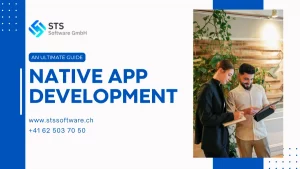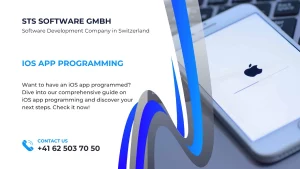In today’s fast-paced digital landscape, businesses are increasingly looking for efficient, scalable, and cost-effective solutions to cater to their mobile application needs. App development in Switzerland is a rapidly growing market, projected to reach US$4,152.00m by 2029, with a CAGR of 10.07% (2022-2029). For Swiss businesses, hybrid mobile app development stands out as a powerful approach. It combines the best of both worlds—allowing companies to build apps that work seamlessly across multiple platforms while saving valuable resources.
Hybrid apps are known for their cost-effectiveness. Rather than developing separate applications for iOS and Android, a single codebase is created and reused for both platforms. Hybrid development significantly reduces development time and costs. This makes it an attractive option for startups and small businesses. Moreover, it’s an attractive option for established enterprises seeking to expand their mobile presence.
Another crucial advantage of hybrid app development is the speed of delivery. With a unified codebase and pre-built components, hybrid apps can be deployed rapidly, allowing businesses to hit the market faster. Additionally, hybrid apps allow developers to make updates and enhancements in real time. This benefit streamlines the process of feature rollouts and bug fixes.
For Swiss businesses, where maintaining a competitive edge is crucial, hybrid apps offer the necessary flexibility. This allows them to adapt to changing market demands without sacrificing quality or performance.
The purpose of this ultimate guide is to help Swiss businesses understand the true potential of hybrid app development. We will walk through the key benefits, important considerations, and the role of a professional hybrid app agency in delivering a successful mobile application that meets your business goals.
Looking for expert hybrid app developers? Hire our top-tier team of app development professionals today to bring your vision to life! Get in touch!
What Is Hybrid App Development?
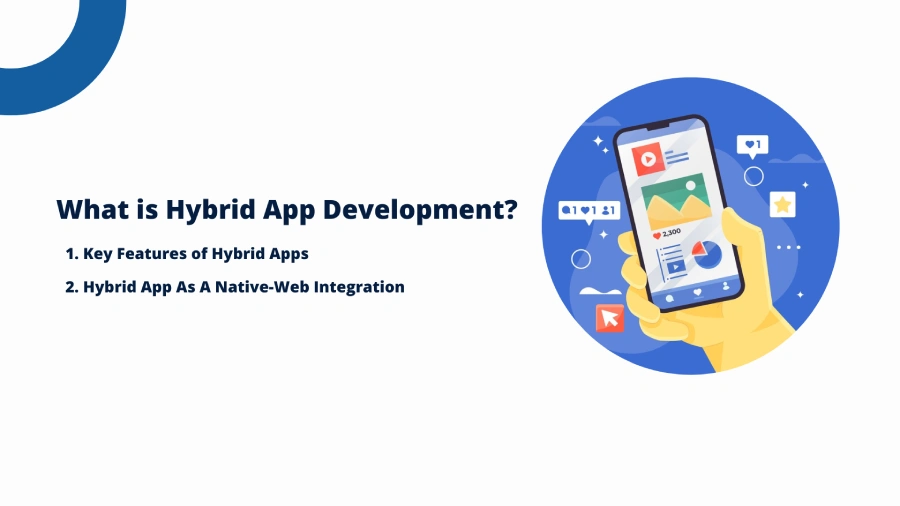
Hybrid app development is a method of app programming that blend’s elements of both native and web applications. This approach allows businesses to create apps that run seamlessly across multiple platforms. It offers the versatility of web technologies combined with the robust performance of native apps.
At the core of hybrid apps, you’ll find that they are built using web technologies such as HTML5, CSS3, and JavaScript. These apps are essentially web applications housed within a native container, known as the WebView container. This container allows the app to mimic the behavior and functionality of native applications. It provides users with an experience like that of apps developed specifically for iOS or Android.
Key Features Of Hybrid Apps:
-
Cross-Platform Compatibility
One of the primary advantages of hybrid applications is their ability to run on multiple platforms Android, iOS, and even Windows with a single codebase. This makes hybrid app development ideal for businesses that want to launch their app across several app platforms like the Google Play Store and the Apple App Store simultaneously without having to build separate versions.
-
Built With Web Technologies
Hybrid apps use popular web programming languages like HTML5, CSS3, and JavaScript, making them easier to develop for teams already familiar with these technologies. This also allows developers to leverage existing web development skills to create mobile apps, cutting down on the need for specialized native developers.
-
Mimicking Native App Behavior
By using a WebView container, hybrid apps can display content and behave like native apps. While the app is essentially a web app wrapped inside a native shell, features like hiding the URL bar and browser elements allow the app to appear fully integrated and natural on mobile devices.
-
App Store Accessibility
Even though hybrid apps are primarily web-based, they can still be downloaded from app stores just like native apps. This is crucial for businesses looking to distribute their app through popular channels such as the Google Play Store and Apple App Store. However, the installation process is slightly different from that of purely native apps due to the integration of web technologies.
-
Hybrid vs. Native Apps
While native apps are built specifically for one platform using platform-specific languages, hybrid apps offer a middle ground. They combine the strengths of native apps (such as performance) with the flexibility of web apps, making them a cost-effective solution. However, for performance-intensive apps, native development may still be the preferred option.
Learn more: Native App vs. Hybrid App vs Web App: Choosing the Right Path for Your Project
Hybrid App As A Native-Web Integration
At its core, a hybrid app is essentially a web application embedded within a native app. It can access many of the device’s features—such as the camera, GPS, and push notifications—just like a native app. However, the actual content of the app is rendered through a web interface.
This unique integration makes hybrid applications highly versatile and an attractive option for businesses. Especially for those looking to develop apps that perform well on multiple platforms while keeping development costs manageable.
In summary, hybrid application development allows businesses to create cross-platform apps efficiently, without the need to maintain separate codebases for each platform. It bridges the gap between hybrid apps and native apps, offering the benefits of both approaches, making it a popular choice in the mobile app development world.
Pros And Cons Of Hybrid Application Development
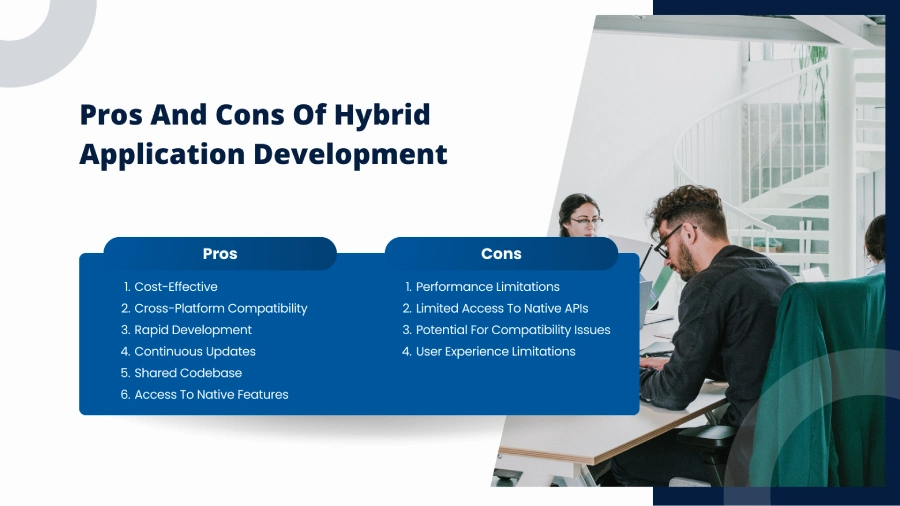
Hybrid application development is a popular choice for businesses aiming to build cross-platform apps without incurring the high costs and lengthy timelines associated with native app development. However, like any development approach, it has its strengths and weaknesses. Understanding the pros and cons of hybrid development will help you make an informed decision based on your specific business needs.
Advantages Of Hybrid Application Development
-
Cost-Effective
One of the most significant benefits of hybrid mobile app development is its cost-efficiency. By using free frameworks such as React Native or Ionic, businesses can significantly reduce both development and maintenance costs. There’s no need to hire separate teams for different operating systems, making it ideal for startups and SMEs looking to build a hybrid app on a budget.
-
Cross-Platform Compatibility
With hybrid apps, businesses can reach a wider audience by targeting multiple operating systems like iOS, Android, and even web browsers using a single codebase. This cross-platform app development approach allows you to deploy your app on various platforms without having to invest in multiple development teams.
-
Rapid Development
Hybrid development offers faster time-to-market compared to native app development. The ability to use a single codebase for different platforms accelerates the development process, allowing businesses to launch their apps quickly and meet market demands faster.
-
Continuous Updates
Hybrid apps allow developers to implement updates and introduce new features more easily. Since changes are made to a shared codebase, updates can be deployed across multiple platforms simultaneously, ensuring a smooth experience for users on different devices.
-
Shared Codebase
A unified codebase across platforms makes hybrid apps easier to maintain. The same code is used across various operating systems, promoting consistency in app design and performance.
-
Access to Native Features
While hybrid apps are primarily web-based, they can still access native device features like cameras, GPS, and push notifications through plugins. This allows businesses to offer a nearly native app experience without building separate apps for each platform.
Disadvantages Of Hybrid Application Development
-
Performance Limitations
One of the downsides of hybrid apps is that they may not perform as smoothly as native apps, particularly for performance-intensive tasks. Applications with complex graphics, such as gaming apps, may experience slower performance compared to their native counterparts.
-
Limited Access to Native APIs
Hybrid apps can access many native device features, but there are limitations. Some device-specific functionalities may require custom plugins or even native code. For businesses needing deep integration with specific device features, native app development may be a better fit.
-
Potential for Compatibility Issues
As operating systems and plugins evolve, hybrid apps may encounter compatibility issues. Updates to iOS, Android, or Windows could lead to unforeseen problems with app performance or appearance, requiring timely fixes and maintenance.
-
User Experience Limitations
While hybrid apps aim to deliver a native-like experience, they might not fully match the fluidity and responsiveness of native apps. This can impact the overall user experience, especially for applications where performance and interface design are key factors.
In conclusion, hybrid application development offers a great solution for businesses looking for platform-independent development. With cost-effective solutions, faster time-to-market, and compatibility across multiple platforms, it is an attractive option. However, businesses should weigh these advantages against the potential drawbacks, such as performance limitations and user experience concerns.
For businesses that need to build hybrid apps, our expert team can guide you through the best hybrid app development framework for your project, ensuring you get the best balance between performance and cost.
What are hybrid app technologies?
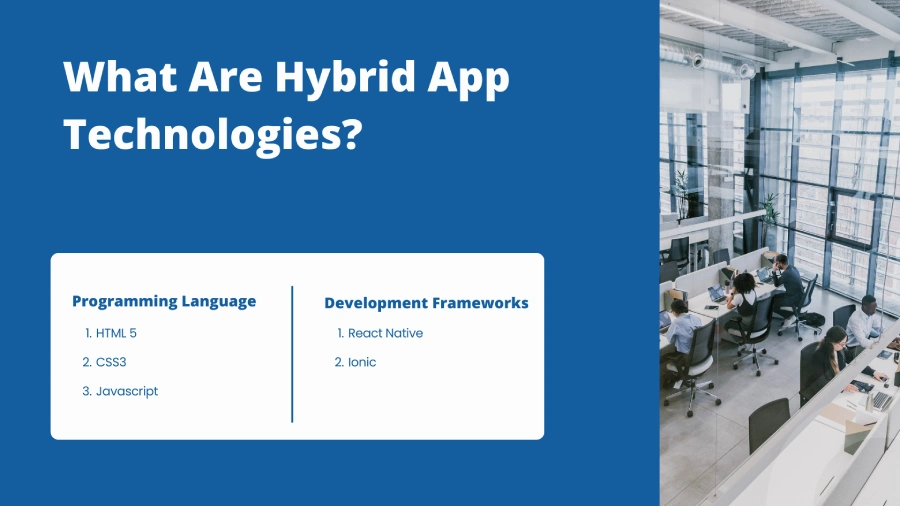
Programming Languages Commonly Used For Hybrid App Development
Hybrid app development relies heavily on widely used web technologies like HTML5, CSS3, and JavaScript. These web technologies enable developers to build apps that can run across multiple platforms while still accessing native device features.
Hybrid apps essentially run inside a web browser, but the browser’s UI elements (like the URL bar) are hidden to create the feel of a native app. Here’s how the core web technologies function in hybrid mobile application development:
- HTML5: This defines the structure and content of the app, just as it does for web pages. It enables developers to arrange text, images, and media within the app and ensures the app’s data is structured correctly.
- CSS3: Handling the design and appearance, CSS3 allows developers to control the look and feel of the hybrid app, making it visually appealing and responsive across different devices.
- JavaScript: This is used for interactivity and connecting the app with the device’s native hardware, such as GPS, camera, sensors, and more. JavaScript plays a crucial role in adding dynamic functionality and responding to user interactions.
Thanks to the use of familiar web technologies, web developers with experience in building websites already have a significant advantage when transitioning to hybrid mobile app development. These developers can reuse their expertise to create hybrid apps that run on various platforms, combining the flexibility of web apps with the power of native device capabilities.
Hybrid App Frameworks
Frameworks play a crucial role in hybrid app development as they help developers integrate operating system-specific functions into their apps. These frameworks provide pre-built components and tools that simplify the development process while ensuring that hybrid apps can access native features such as cameras, notifications, and geolocation. Two of the most popular hybrid app frameworks are Ionic and React Native.
1. Ionic Framework
Ionic is a widely used, open-source software development kit (SDK) designed specifically for building hybrid apps. This hybrid application framework utilizes standard web technologies like HTML5, CSS3, and JavaScript, along with additional languages like Sass and TypeScript, to create feature-rich mobile applications.
- Angular Integration: Ionic works seamlessly with Angular, a powerful JavaScript framework, to manage the app’s structure and logic, while Ionic itself handles the user interface. This integration allows developers to efficiently build apps with complex features.
- Extensive Libraries and Plugins: Ionic provides access to a vast library of plugins and components that make it easier to connect with native device features, such as cameras, push notifications, and sensors.
- Native-Like Appearance: One of the standout features of Ionic is its ability to customize apps so that they look and feel like native apps on both iOS and Android platforms.
2. React Native Framework
Developed by Facebook, React Native is another popular open-source framework for hybrid mobile application development. It allows developers to use JavaScript while integrating XML-like elements known as JSX, which makes it easy to design rich, interactive user interfaces.
- Web Technologies with Native Capabilities: React Native doesn’t require developers to learn native languages like Swift or Java. It simplifies the process of developing hybrid apps, as you can write once and deploy to multiple platforms.
- Plugins and npm Packages: While React Native has limited built-in features, developers can extend its capabilities with numerous npm packages and third-party plugins to access native device functionalities.
- Field-Tested for Performance: React Native has been extensively tested and optimized for performance, making it a reliable choice for hybrid app development. Many well-known companies, such as Instagram and Airbnb, have successfully built their mobile apps using this framework, demonstrating its scalability and robustness.
Both Ionic and React Native are excellent choices for hybrid development, depending on the project’s specific needs. Ionic excels in creating visually appealing apps with a native-like appearance, while React Native focuses on providing high-performance apps with minimal native code.
By leveraging these hybrid app technologies and frameworks, businesses can efficiently program a hybrid app that is compatible across multiple operating systems like Android, iOS, and Windows, without the need for separate codebases.
Ready to build your hybrid app? Let’s discuss your project today and find the perfect framework. Let discuss your app need!
Hybrid App Development Process
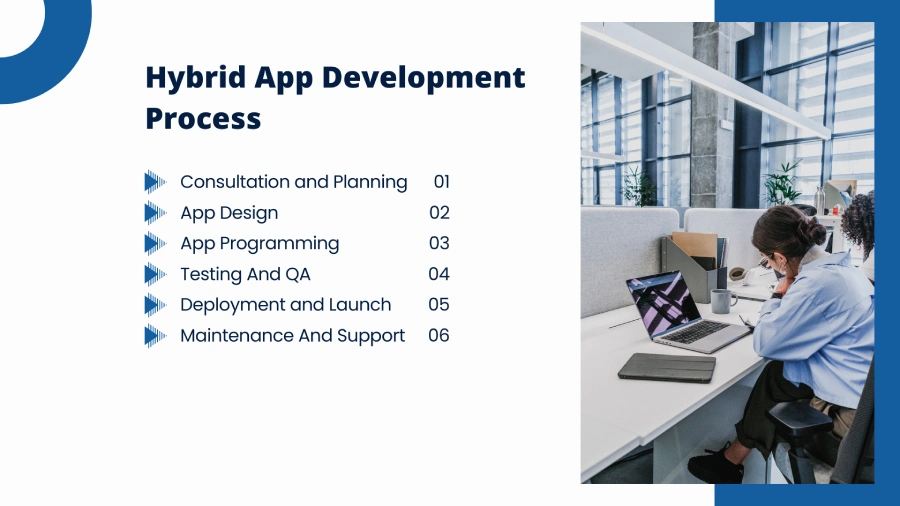
The hybrid app development process follows a structured approach that ensures the creation of a high-quality, cross-platform mobile application. From initial consultation to ongoing support, each phase is carefully executed to meet the unique needs of the business and ensure the app performs well across multiple platforms. Below is an overview of the key steps involved in hybrid development.
Consultation and Planning
The first step in the hybrid app development process is understanding the client’s requirements and defining the scope of the project. During this phase, the development team collaborates closely with the client. Together, they work to gain a deep understanding of the business goals, target audience, and specific features required for the app. Detailed discussions help in identifying key functionalities, platform preferences (iOS, Android, or web), and project timelines. This consultation phase sets the foundation for the entire app development process and ensures alignment between the client’s vision and the development team’s approach.
App Design
Once the project scope is clearly defined, the design team begins creating wireframes and mockups. This phase involves laying out the app’s user interface (UI) and user experience (UX), ensuring that the design is both intuitive and user-friendly. The wireframes outline the structure of the app, while the mockups provide a detailed visual representation of the final product. By focusing on app design early in the process, businesses can ensure that the app will deliver a seamless experience across different platforms.
App Programming
After finalizing the designs, the actual development of the app begins. The development team uses hybrid app technologies like HTML5, CSS3, and JavaScript to build the app. Popular frameworks like React Native or Ionic are often used to streamline the development process and provide access to native device features. During this phase, developers focus on coding the core functionality. Moreover, they integrate various features such as GPS, push notifications, and camera access. The goal is to build a hybrid mobile app that is efficient, functional, and consistent across different platforms.
Testing And Quality Assurance
No app development process is complete without thorough testing and quality assurance. This phase involves rigorous testing of the app to ensure it works flawlessly on different devices and platforms. Developers run various tests to identify and fix bugs, optimize performance, and ensure compatibility across operating systems. Testing also focuses on the app’s responsiveness, security, and ability to access native device features. Quality assurance ensures that the app is ready for launch and provides a smooth user experience.
Deployment And Launch
Once the app has passed testing, it’s time for deployment and launch. The hybrid app is published to both the Google Play Store and the Apple App Store, making it accessible to a wide audience. The deployment process involves ensuring that the app meets the guidelines for both app stores and optimizing the app for App Store Optimization (ASO) to improve its visibility in search results. A smooth launch is critical for maximizing downloads and user engagement.
Maintenance And Support
After the app is live, ongoing maintenance and support are crucial to its long-term success. This includes regular updates to fix bugs, enhance performance, and introduce new features. The development team provides continuous support. It ensures that the app remains compatible with new operating system updates and functions smoothly over time. Effective customer support is essential for addressing user feedback and keeping the app relevant in a competitive market.
By following this comprehensive hybrid app development process, businesses can create high-performing apps that offer the flexibility of hybrid technologies while delivering a near-native experience to users.
Looking to build a hybrid mobile app? Our hybrid development services can deliver. Contact us now!
How Much Does It Cost To Develop A Hybrid App?
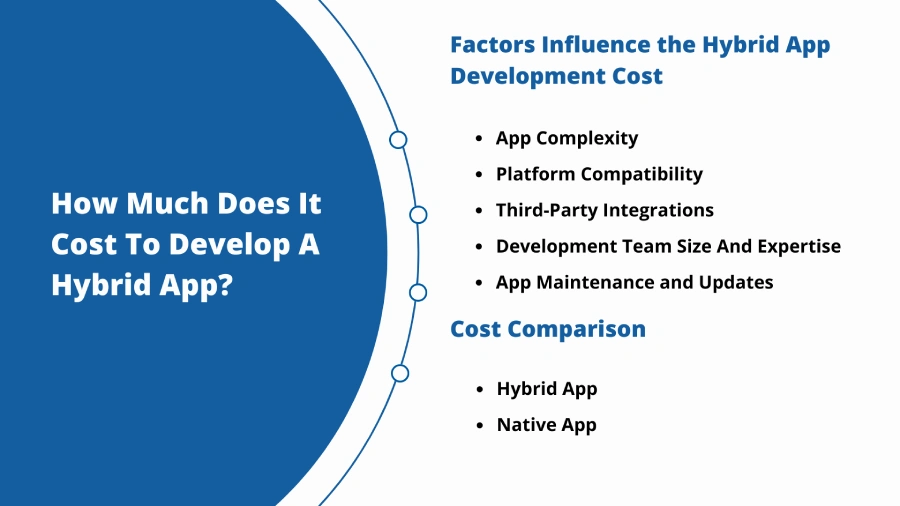
Hybrid mobile app development offers businesses a cost-effective way to build apps that work on multiple platforms, such as iOS, Android, and Windows. However, like any development approach, the cost of building an app depends on various factors. Understanding these factors will help you estimate the overall development costs and compare them to native app development.
What Factors Influence The Hybrid App Development Cost?
Several elements determine the cost of hybrid app development, ranging from the complexity of the app to the size of the development team. Here are the key factors that influence the final price:
- App Complexity: The more features and functionalities your app requires, the higher the cost. Simple apps with basic features will be more affordable, while complex apps with rich features, intricate UX/UI design, and advanced interactions will require more time and resources.
- Platform Compatibility: While hybrid apps allow for cross-platform compatibility, integrating your app across multiple app platforms such as iOS, Android, and Windows can influence the cost. The number of platforms you want to target will affect the time and effort required for optimization.
- Third-Party Integrations: If your app needs to connect with external services, such as payment gateways, social media logins, or analytics tools, you’ll need to integrate APIs and SDKs. The complexity of these third-party integrations can drive up development costs, especially if they require custom development.
- Development Team Size and Expertise: The size and expertise of your app development team also impacts the cost. A larger, more experienced team will typically deliver faster and higher-quality results. But this comes at a higher cost compared to a smaller or less experienced team.
- App Maintenance and Updates: After launching the app, regular updates and ongoing maintenance will be required to ensure the app continues functioning smoothly across different operating systems. This is particularly important for hybrid apps, which may need frequent updates to adapt to changes in platform requirements.
How Do Hybrid Mobile App Development Costs Compare To Native App Development?
When choosing between hybrid and native app development, it’s essential to understand how the costs differ. Below is a comparison table outlining the key differences between hybrid mobile app development and native app development.
Hybrid Apps
- Use a single codebase for multiple platforms, reducing both development and maintenance costs.
- Faster development due to web technologies like HTML5, CSS3, JavaScript, and frameworks like Ionic.
- Less extensive testing is needed, as the shared codebase allows for simultaneous cross-platform fixes.
- May encounter performance or compatibility issues, leading to additional development time and costs.
- Require more frequent updates and fixes to maintain performance and compatibility.
Native Apps
- Require separate codebases for each platform (iOS, Android, etc.), resulting in higher costs.
- Slower development as separate coding is required for each platform, especially for complex features.
- Each platform requires its own set of tests to ensure compatibility, increasing the time and effort.
- More predictable costs and timelines, with fewer surprises due to established development standards.
- May have higher initial costs but lower long-term maintenance due to stable platform-specific builds.
In conclusion, hybrid mobile development typically offers lower upfront costs and faster development times compared to native apps, making it an ideal choice for businesses looking to build cross-platform apps efficiently. However, potential performance issues and more frequent updates may add to long-term costs. This making it important to weigh the pros and cons carefully based on your specific project requirements.
If you’re considering developing a hybrid app, understanding these cost factors can help you make a more informed decision. Whether you’re targeting multiple platforms or looking for cost efficiency, a skilled hybrid app development team can guide you through the process and help you choose the right approach to meet your business goals.
Want a cost-effective hybrid app? Let’s discuss your app project today and get started. Discuss your app need!
Is A Hybrid App Development Suitable For Our Company?
Hybrid apps are a great solution for many businesses, particularly when certain factors align with your goals and resources. They are ideal for companies that require:
- Rapid time-to-market: If your business needs to launch an app quickly, hybrid development enables faster development cycles, allowing you to reach the market sooner.
- Limited budget: Hybrid apps are more cost-effective than native apps because they use a single codebase across multiple platforms (iOS, Android, web). This reduces both development and maintenance costs.
- Cross-platform compatibility: Do you want your app to work seamlessly across various platforms? Hybrid development allows you to create an app that runs on different operating systems using one shared codebase.
- Web-based features: If your app heavily relies on web-based features, a hybrid app is the best choice. Because this app development approach leverages web technologies (HTML5, CSS3, JavaScript) that integrate smoothly with native functions.
- Simple user interface (UI): Hybrid apps are ideal for apps with basic user interfaces where performance and highly customized animations are not a priority.
Why Choose STS Software GmbH As Your Trusted Hybrid App Development Company In Switzerland?
STS Software GmbH is a professional app development company in Switzerland that has been serving businesses in Switzerland since 2012. We offer cost-effective solutions and leverage our deep expertise to provide high-quality, tailor-made apps for companies of all sizes. Here’s why we are your best choice for hybrid app development services:
- Proven expertise: Our experienced team of developers has extensive knowledge in hybrid app development. We build highly functional apps using frameworks such as React Native and Ionic.
- Agile methodology: Our efficient and flexible development process ensures smooth collaboration with clients and the ability to quickly adapt to changing requirements. This results in faster time-to-market and optimized project workflows.
- ISO Certification: We are ISO-certified (ISO 9001 and ISO 27001). These certifications demonstrate our commitment to delivering high-quality software solutions that meet global standards.
- Advanced technologies: Our app development team is well-versed in the latest technologies, including Artificial Intelligence (AI) and Machine Learning (ML). These advanced technologies can be integrated into your app to enhance functionality and improve user experience.
Whether you’re looking to build a hybrid mobile app or scale your existing project, STS Software GmbH is ready to turn your ideas into reality. Develop your own hybrid app with STS Software GmbH!
Need a trusted partner for hybrid app development? Contact STS Software GmbH today to get started with your project.
Conclusion
In today’s competitive market, hybrid app development offers a powerful solution for businesses looking to build cross-platform apps quickly and cost-effectively. With the right partner, like STS Software GmbH, you can leverage the best of hybrid development to create a robust, user-friendly app that meets your business objectives. Whether you’re a startup on a limited budget or an established company needing fast deployment, hybrid apps can deliver excellent value. Create your hybrid app with us today!

